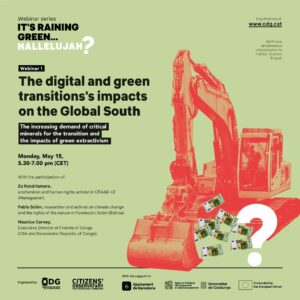
Date: Monday, 15 May, 5:30-7:00 pm (CET)
The twin transition, green and digital, is being put forward within the European institutions as a central solution to combat the climate emergency. This technology-based transition – renewables, electric vehicles, green hydrogen, digitalisation – requires critical and strategic materials that are spread around the world. We are talking about copper, lithium, manganese, nickel, cobalt, graphite, rare earths, molybdenum, silicon, indium, gallium, germanium, chromium and a long etcetera. These materials are found in territories such as the high Andean salt flats between Bolivia, Argentina and Chile for lithium, the Katanga region in the Democratic Republic of Congo for cobalt, the Palawan archipelago province in the Philippines for nickel or Bayan Obo in China’s Inner Mongolia for rare earths, among many others.
European instruments such as the European recovery fund, NextGenerationEU or REPowerEU act as accelerators of the demand for technologies and, therefore, for the raw materials needed to manufacture them.
Faced with this situation, what are the impacts on the countries of the South? What are the alternatives to a new extractive cycle? Is industrialisation possible in the South? What are its limits? What clearly post-extractive policies can be envisaged?
All these questions were addressed during a conversation between four international speakers with different profiles (plus the moderator), on a webinar attended by 95 people (of which 66 were from the EU). Simultaneous interpretation was provided in Catalan, Spanish and English. Participants could ask questions via the Q and A of the Zoom platform, which were answered during the last half an hour of the webinar.
The objective of the webinar was to make visible the material basis of the twin transition centred on technologies, and to analyse it from a global justice perspective as well as to talk about other possible transitions that take into account the biophysical limits of the earth as well as human rights.
The invited panelists (which can be consulted here) came from different countries and regions of the world where mining related to the green and digital transition takes place. They had different backgrounds such as civil society organisations as well as a former member of a national government or university research groups. This diversity of speakers generated interest and attracted a large and diverse audience.
The theme of the webinar was related to a video, part of a series of three videos titled Uncovering the Green Transition, that was launched prior to the webinar through the social networks X and Instagram (the short version) and through YouTube (the full version) in English and with subtitles available in English, Spanish and Catalan. You can watch the video here.
The recording of the webinar can be retrieved in the original version, in English, in Spanish and Catalan.
More details on the webinar and how it was evaluated by the participants through the EU Survey on Justice, Rights and Values, that was sent after the webinar, can be found in the detailed event description here. The overall assessment of the webinar by its participants reached a score of 4,7 out of 5.

